How to choose a sofa for the living room?
There are several important points to consider:
- The purpose of the sofa: will it be the center of the interior or will it complement the rest of the furniture? Will it be used actively? Will it serve as a bed for guests?
- The size of the living room. A large sofa will not fit into a cramped space, and a miniature one will be “lost” in a spacious room.
- The style of the interior. The selected upholstered furniture should be in harmony with the decor and decoration of the room.
What is the best upholstery material for a living room?
Comfort is the main indicator for a sofa, but the practical side of the issue is no less important.
Let’s consider three main types of upholstery:
- Leather. An expensive material that will add a touch of luxury to the decor. Wear-resistant, but has poor breathability. Not comfortable for exposed body parts.
- Eco-leather. Combines the advantages of leather upholstery (strength, appearance), but is cheaper, and the tactile sensations are many times more pleasant.
- Fabric. Provides unlimited possibilities for design and texture. It is recommended to choose a fabric that is resistant to dirt and stress: matting, velor, flock, jacquard, tapestry.
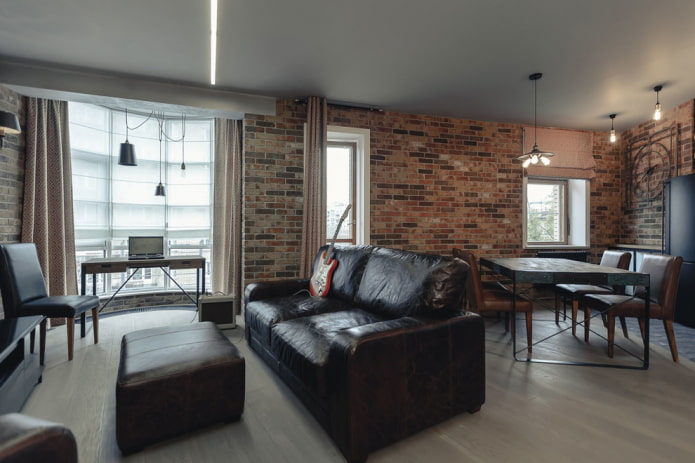
The photo shows a stylish leather sofa in a youth loft.
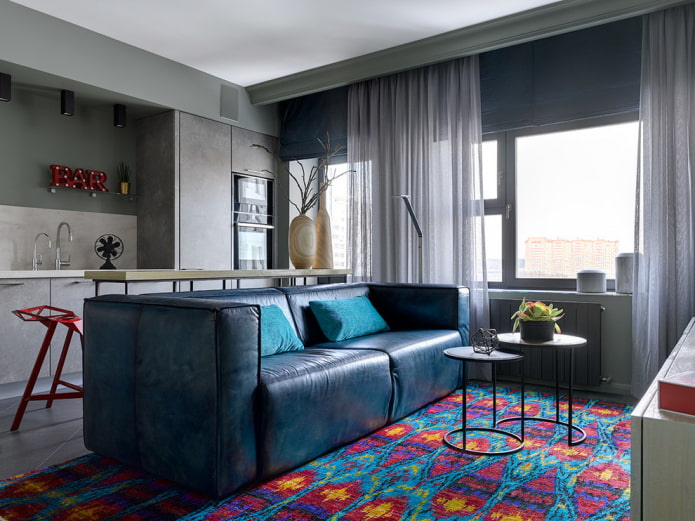
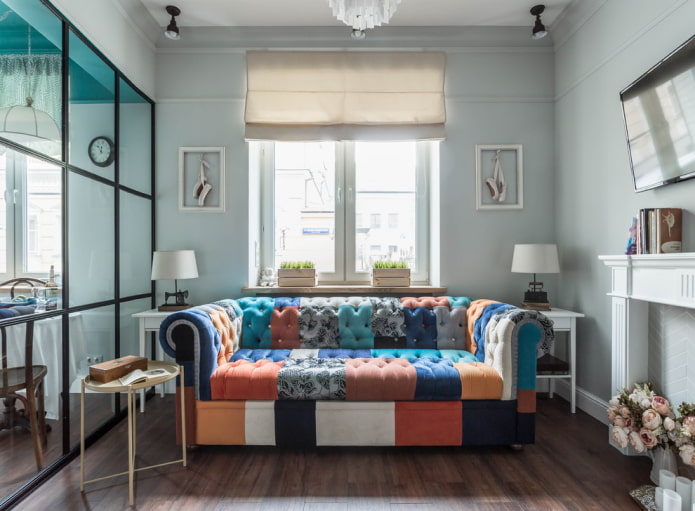
Which transformation mechanism is better for the living room?
When choosing a sofa by transformation type, you should pay attention to the design features, ease of unfolding and the presence of a linen drawer. There are several types of mechanisms:
- Book. An unpretentious design, proven over the years. Two parts easily turn into one, there is a roomy linen drawer.
- Click-clack. An improved version of the “book” mechanism. In addition to the back and seat, the armrests are also transformed. It has three levels of unfolding: sitting, lying and an intermediate position for rest.
- Eurobook. Unlike the “book”, it does not need to be moved away from the wall to unfold. The seat rolls forward and the backrest goes down. There is a linen box.
- Accordion. It unfolds lengthwise if you pull the seat towards you. A full-fledged sleeping place consists of three parts, the joints of which are not felt.
- Folding bed. A sofa with a metal frame and a thin mattress folded in three and hidden under a seat made of individual cushions.
- Sedaflex. A modified model of a “folding bed”. In it, in addition to the seat cushions, the back cushions are also transformed.
- Dolphin. The lower part of the bed quickly and easily “jumps out” when unfolding, which is how the mechanism got its name.
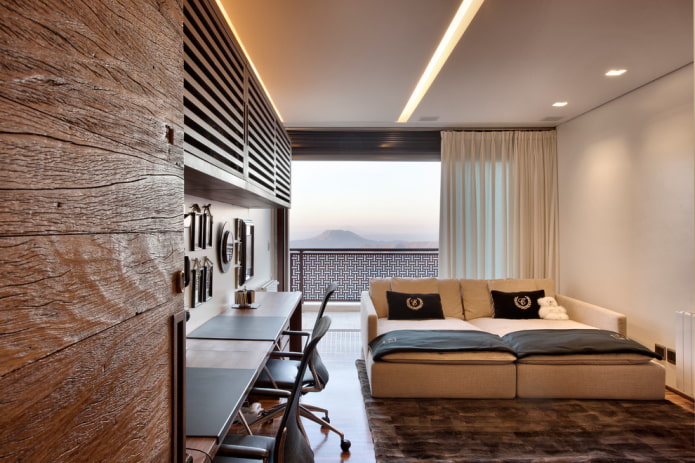
The photo shows a spacious living room with an unfolded sofa.
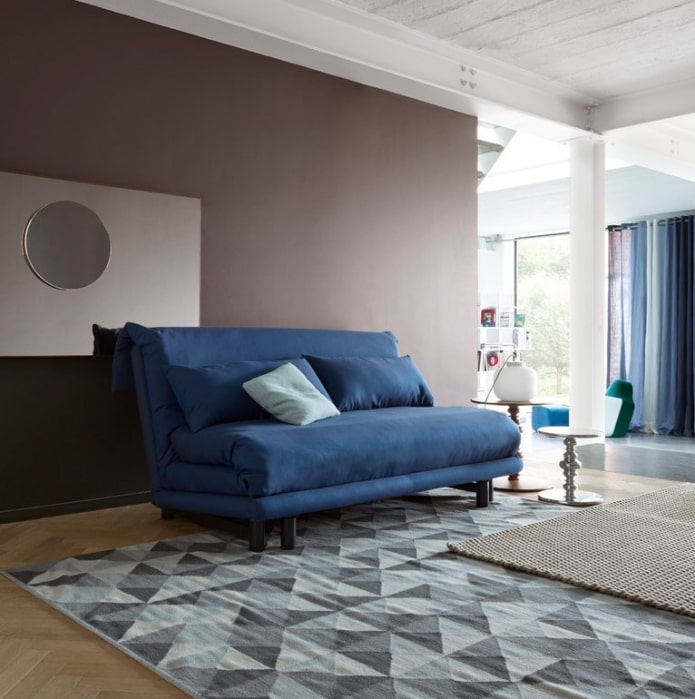
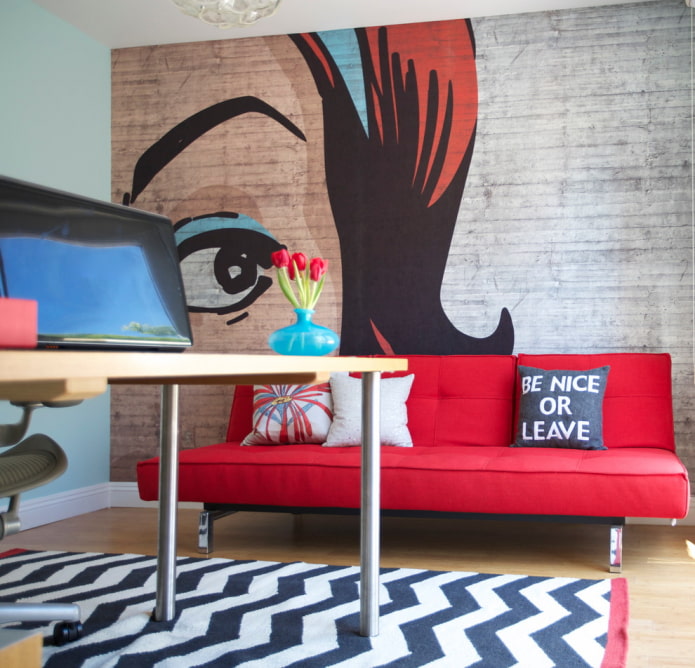
Shapes and sizes of sofas
In addition to standard straight sofas, manufacturers offer original designs for every taste.
Corner
Distinctive characteristics of sectional corner sofas are spaciousness and versatility. As a rule, they have drawers for linen. They look great in the company of rectangular or oval coffee tables.
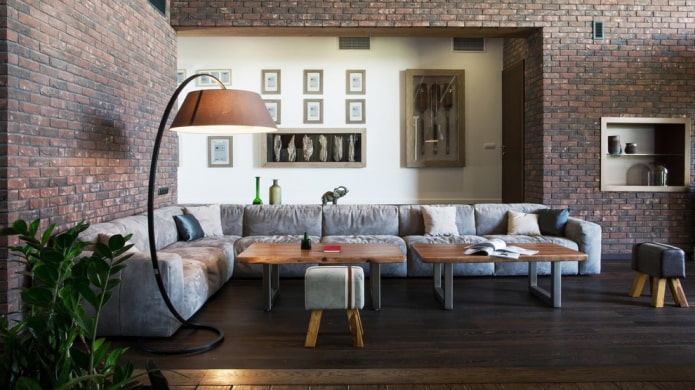
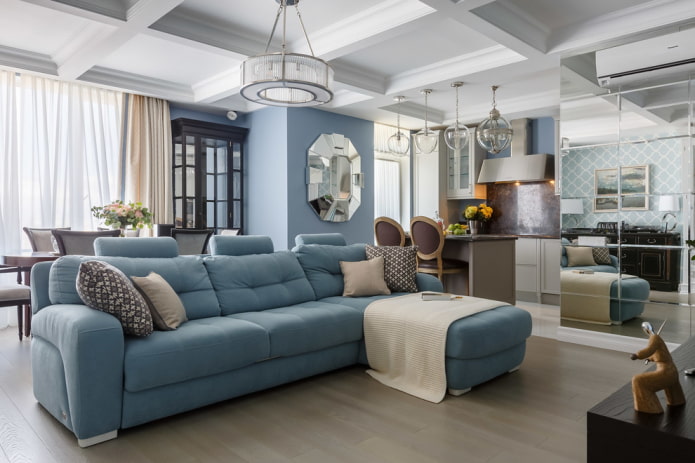
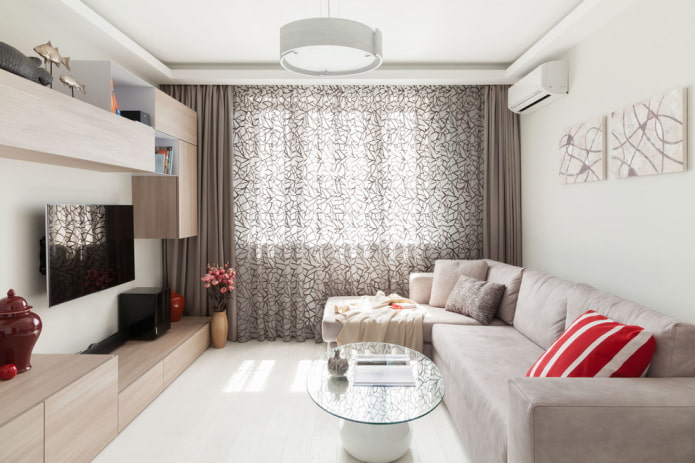
Corner in an L-shaped sofa it is located on the right or left. There are also universal designs, where the modular part can change its location if necessary.
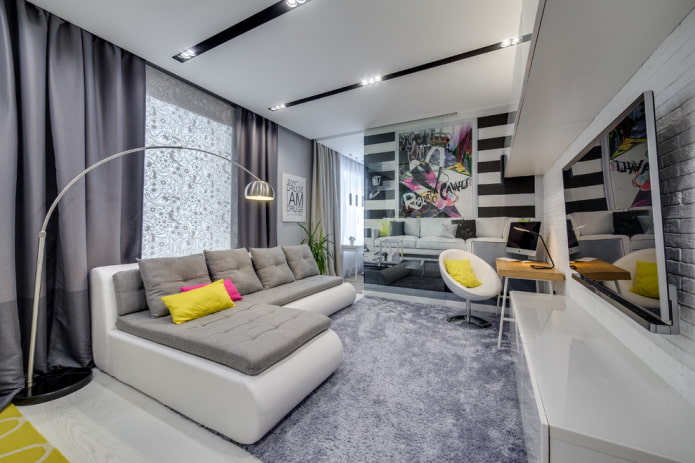
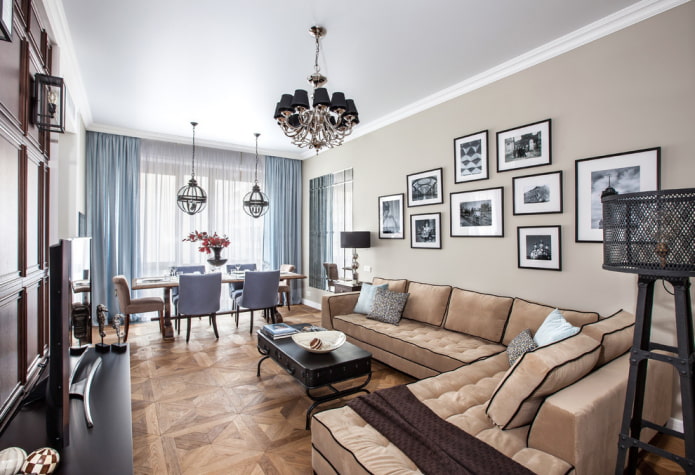
Semicircular and round
Such models are not always practical, but they look very original in the living room interior.
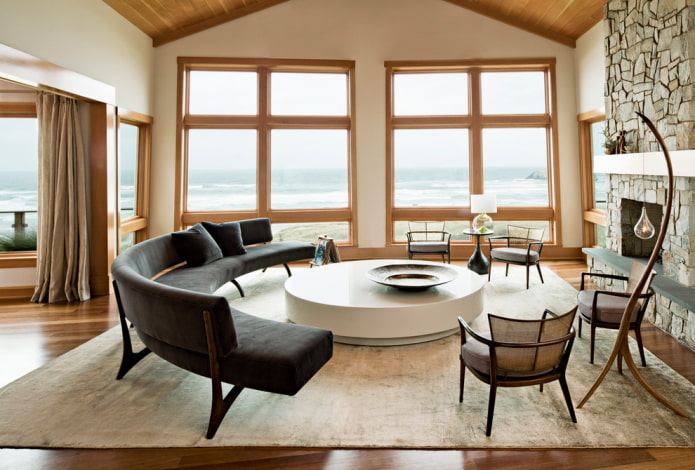
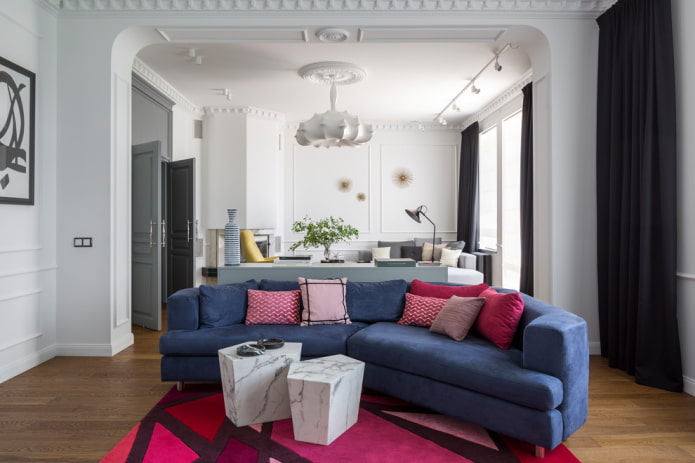
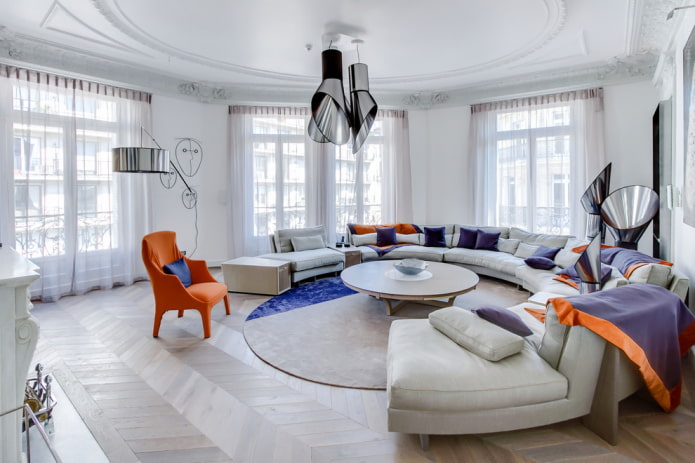
The photo shows a fireplace room with a rounded sofa that matches the table and stucco on the ceiling.
U-shaped
Suitable for large apartments. It accommodates a maximum of people in the living room, and there is no need to buy additional chairs.
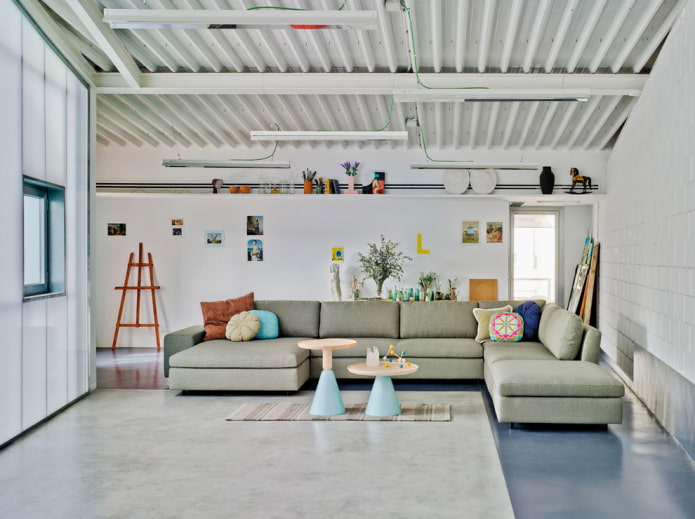
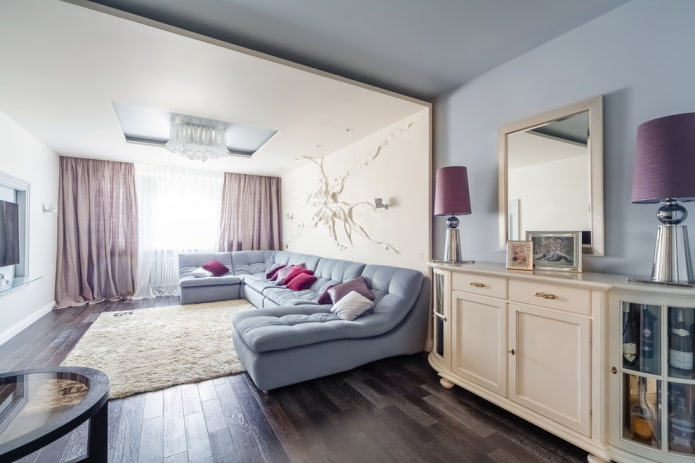
Small sofas
A practical type of furniture: due to its compact size, it fits in a small living room or studio apartment.
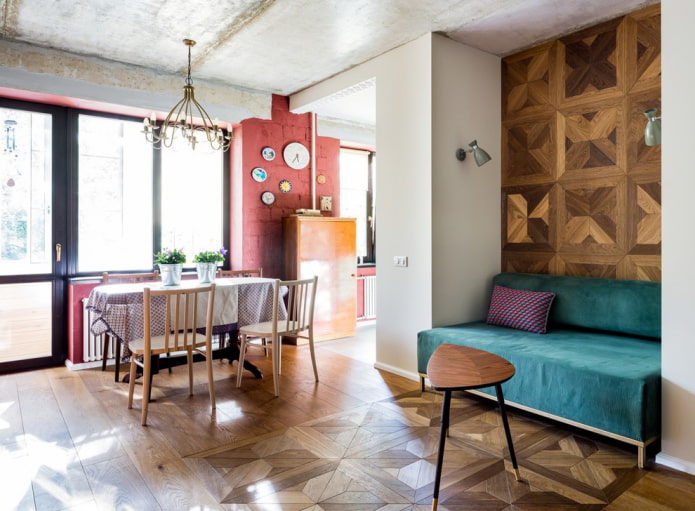
In the photo, a narrow sofa fills the space, located in a wall niche.
A large sofa for the entire living room
If the layout allows you to give the sofa most of the area, it is quite possible to find five- or six-seater designs on the modern market. Such royal furniture takes up the entire wall. Suitable for a large family or very hospitable hosts.
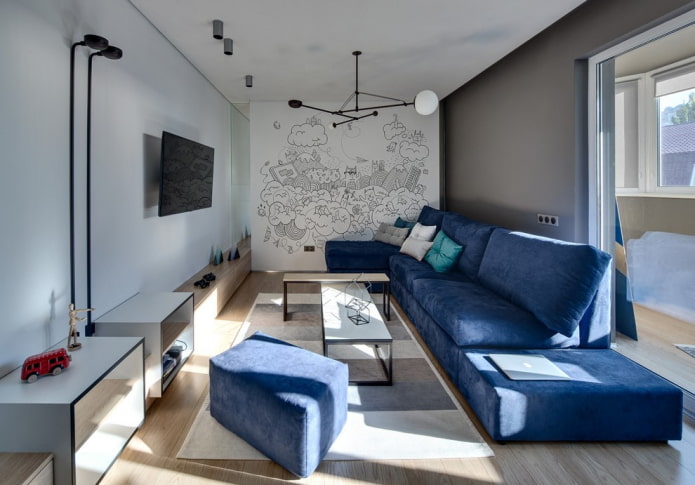
The photo shows a long corner sofa with a comfortable high back, located opposite the TV.
Sofa design options in the interior
Today, designers have stopped limiting their imagination, since modern furniture manufacturers can bring any idea to life.
With drawings and patterns
Multicolored patterns on the upholstery will appeal to connoisseurs of retro. Fabric with flowers will fit into both Victorian and Provence styles. Fabric in a traditional checkered pattern will bring respectability to the environment. Striped upholstery will emphasize the graphic nature of the interior and add dynamics to it.
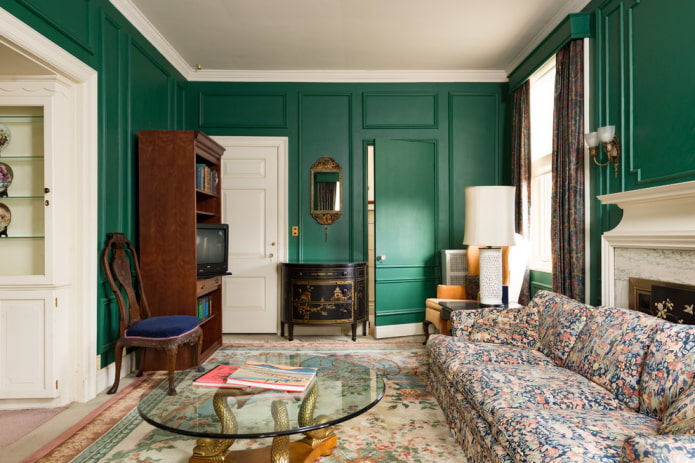
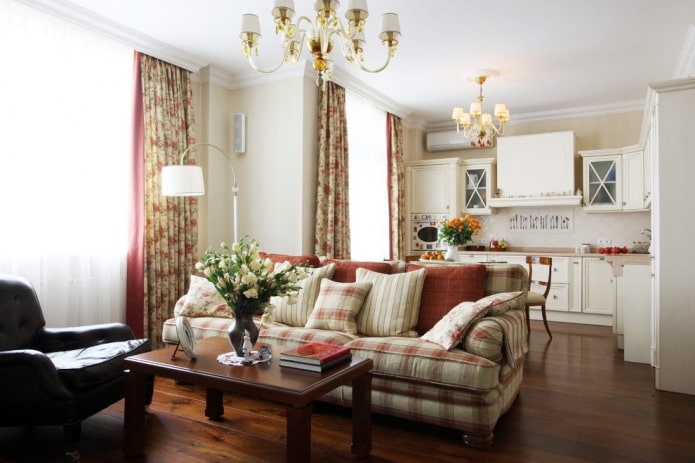
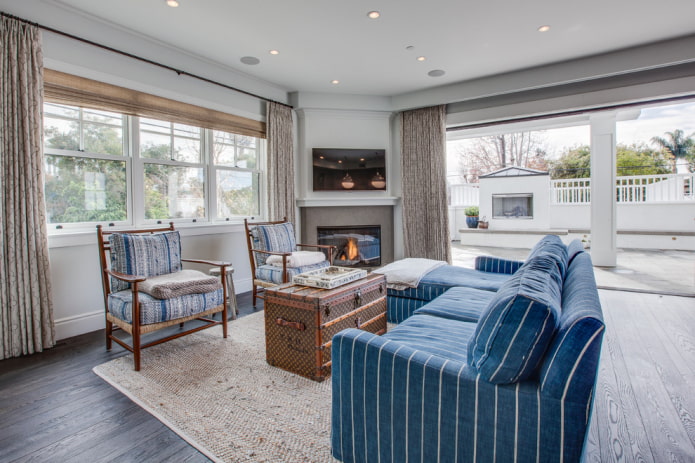
In the photo, a thin white stripe on a blue sofa is a common technique for recreating a nautical style.
Two sofas in the living room
A pair of sofas in the hall is a good way to furnish a spacious room. They create a right angle or are placed opposite each other. It is not necessary to choose identical models – two-color combinations look more interesting.
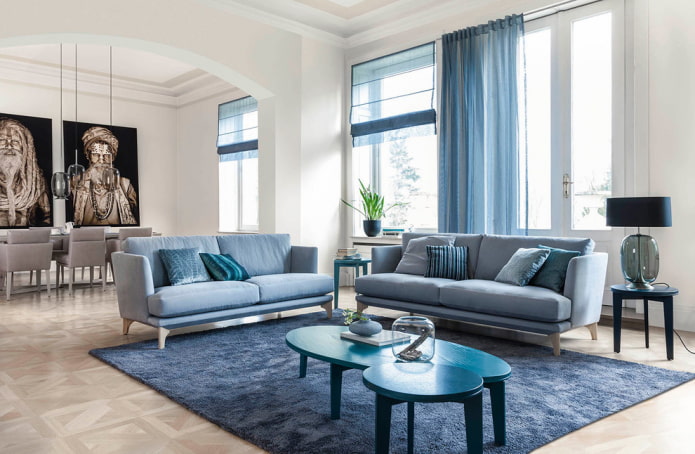
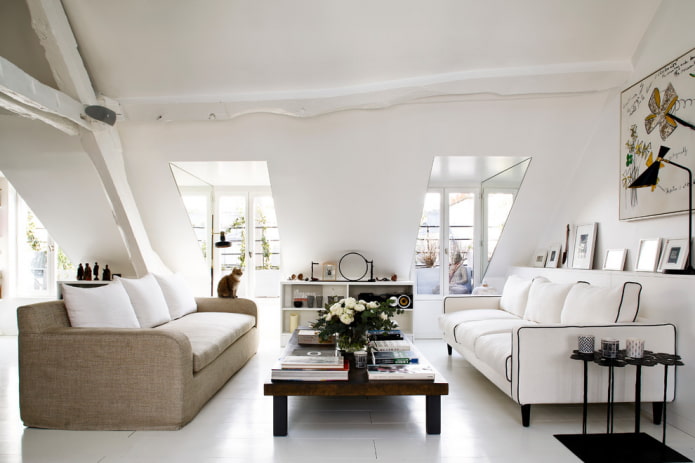
Chester
A legendary sofa of English origin. It has several recognizable features: chic curved armrests, carriage coupler on the back, leather (less often – fabric) upholstery. Chesterfield invariably becomes an adornment of any – not only classical – living room.
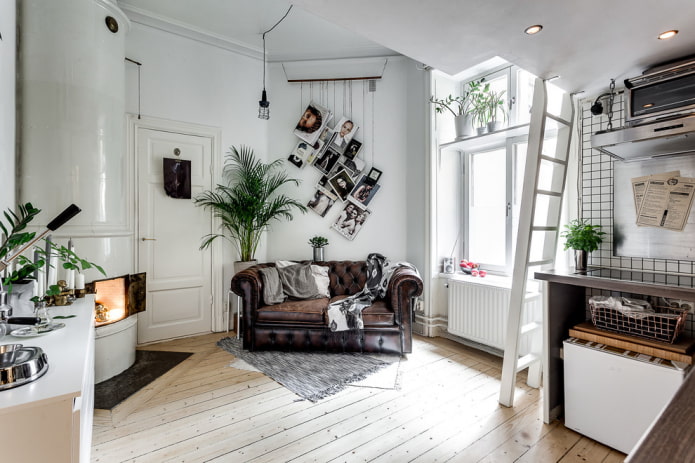
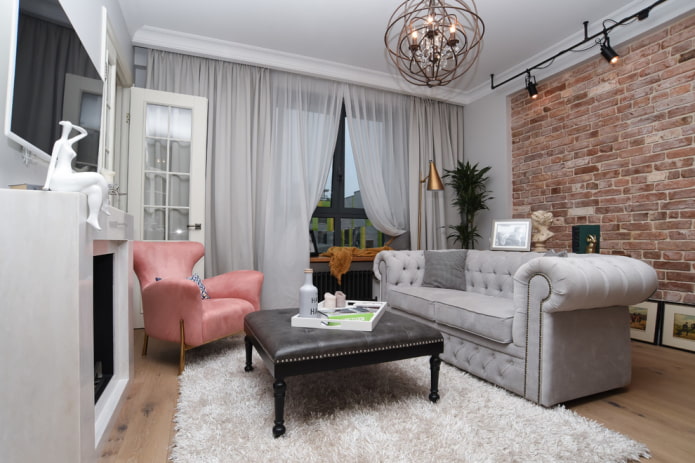
With an ottoman
An ottoman is a very functional piece of upholstered furniture, which serves as a footrest, table or chest. The ottoman can be square, rectangular or round.
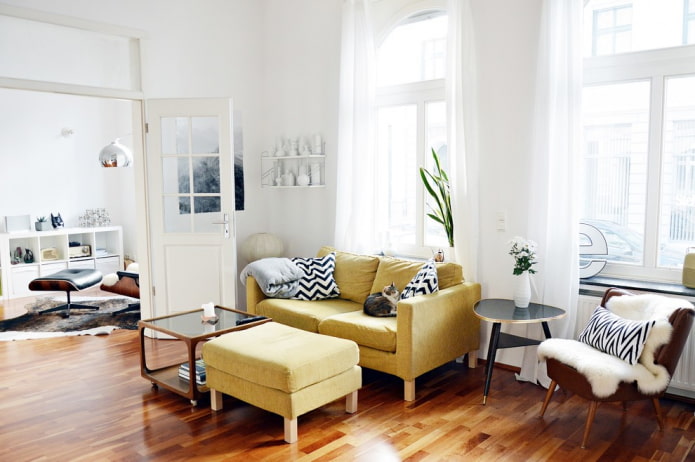
The photo shows a rectangular ottoman on legs. Comes with a mustard-colored sofa.
How to choose the color of a sofa for the living room?
Designers advise avoiding combinations close to the shade of the walls: it is better to select furniture by playing on contrasts. A light sofa will fit better into a dark living room and vice versa: dark or bright furniture in rich tones will look good in a light interior. A monochromatic palette is appropriate if the goal is to “dissolve” the sofa in the setting.
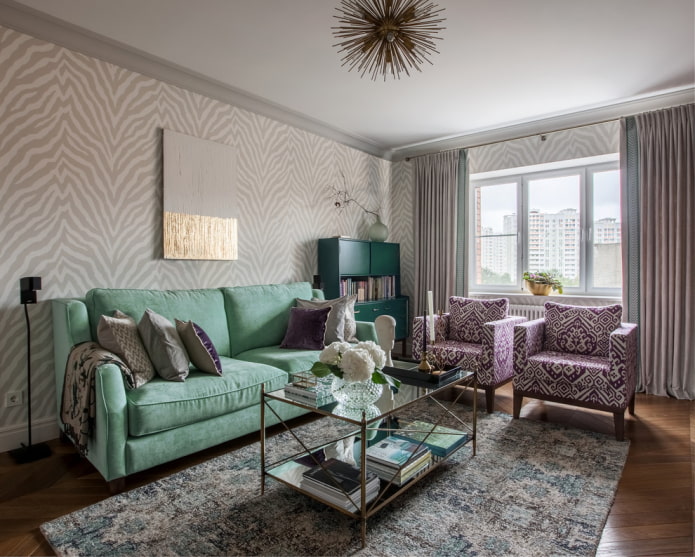
In the photo, the mint-colored sofa fits perfectly into the setting of muted tones. The cool shade of the upholstery harmonizes with the rich emerald-colored wardrobe.
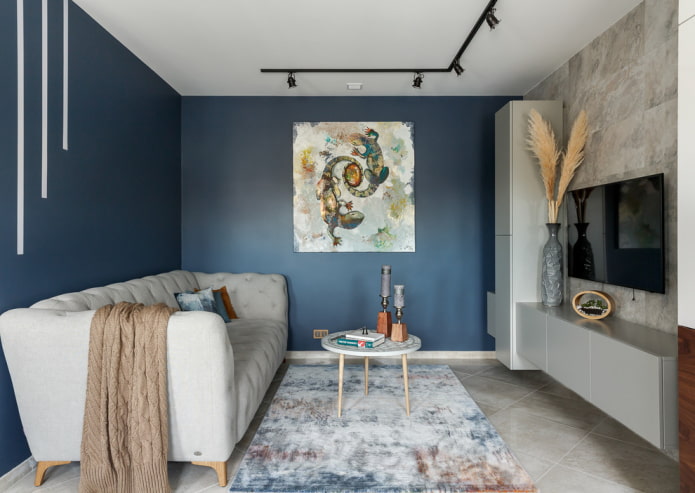
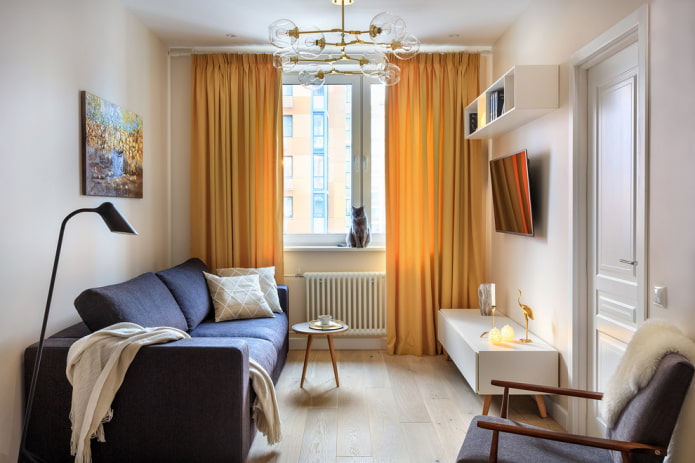
Sofa colors
When choosing a color palette, you need to rely on your own preferences. The most common furniture is basic – white, gray and black – tones. But rich shades are also successfully used in the living room interior, because it is the color that gives the environment a special character and influences the mood.
Harmony can be achieved in design by combining warm (or cold) tones of upholstery with neutral trim or with each other. Cool shades – lilac, turquoise, light blue, emerald, dark blue, violet – are energetically inactive, help to relax.
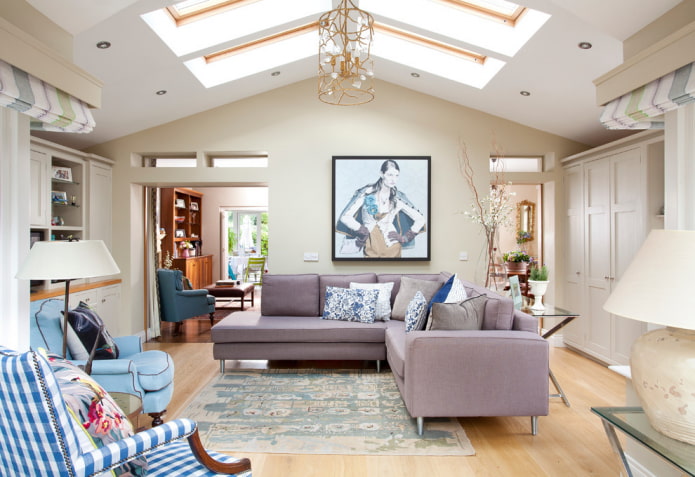
The photo shows a harmonious combination of a lilac sofa and a warm range of floors and walls.
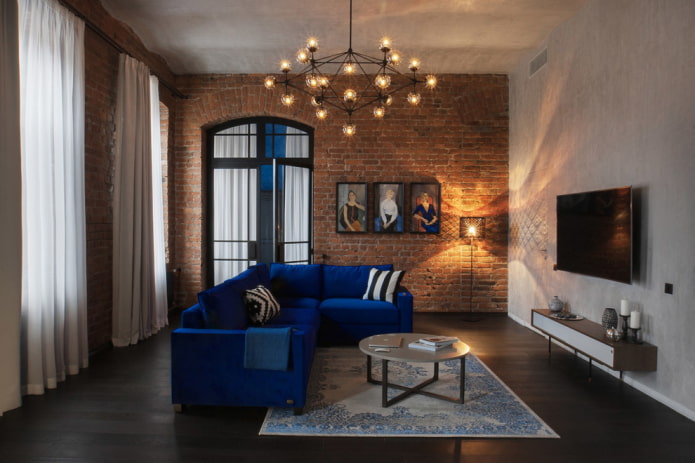
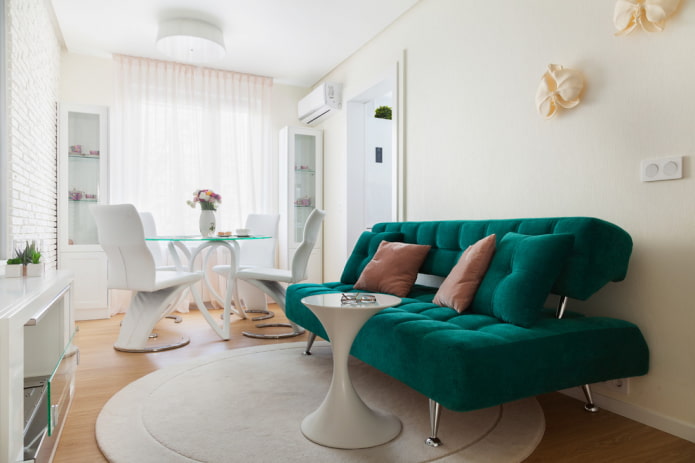
Warm shades – orange, red, yellow, grass green, burgundy, brown – will make the room cozy, lift the mood.
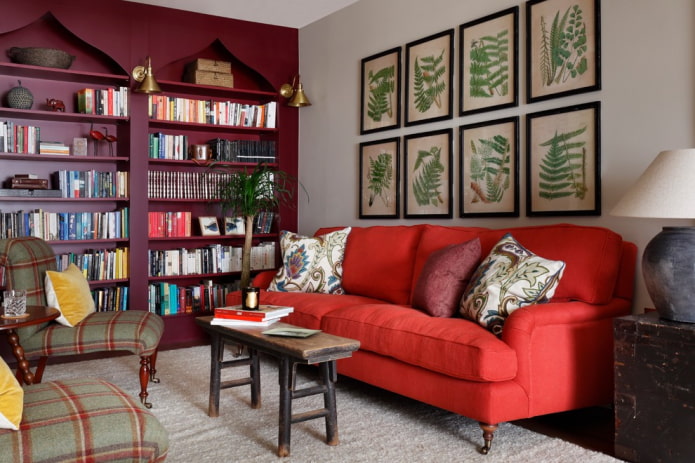
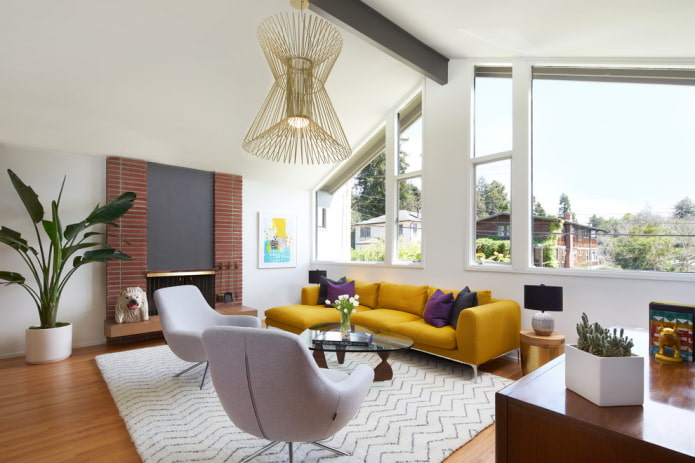
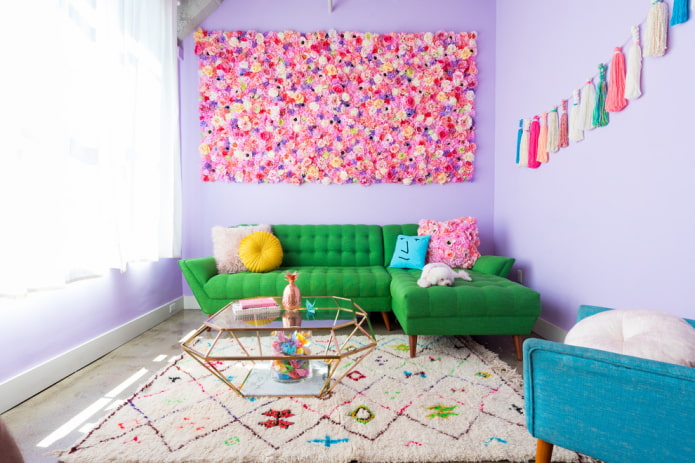
How to Place a Sofa in the Living Room?
In designer interiors, the optimal place for the sofa is chosen, and these are not always the popular options “near the wall”, “opposite the TV” or “near the fireplace”.
If the living room is small, it can be placed by the window: this will free up three walls for maneuvering and save space. The only drawback is that sleeping near the radiator is not always comfortable.
If the window in the living room is a bay window, the sofa should be placed so as to provide a circular walkway. This is possible only in a spacious room, as is the “in the middle of the room” option, when zoning is necessary. Suitable for a kitchen-living room.
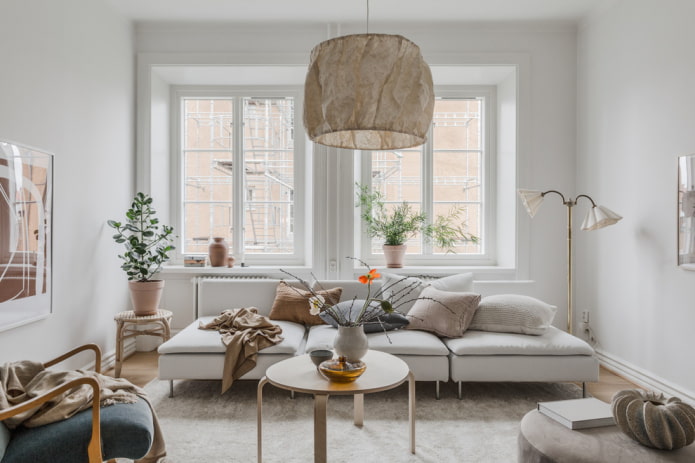
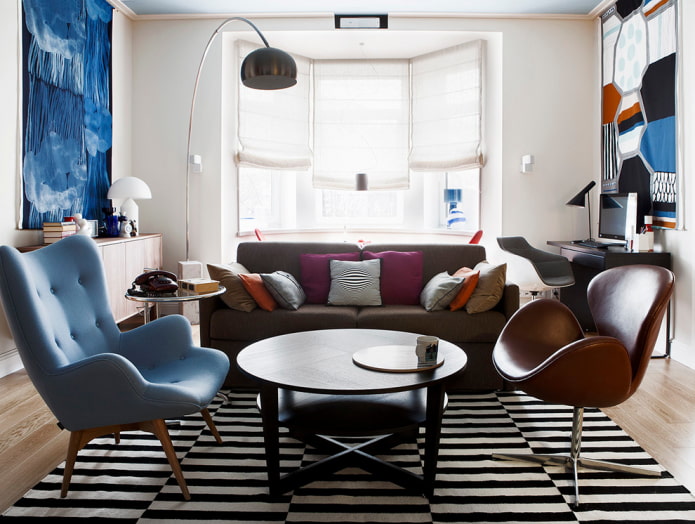
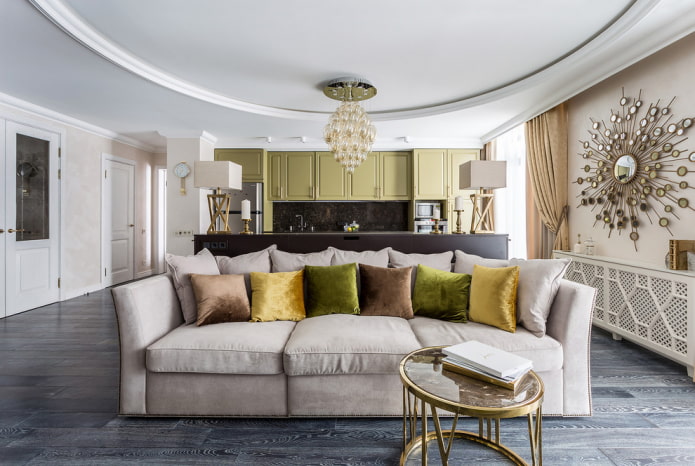
By According to the recommendations of the Eastern teaching of Feng Shui, upholstered furniture should not be placed opposite the door, since all the unfavorable incoming energy will be directed at the person. But sometimes in narrow spaces this is the only way out.
If there is a niche in the living room or there is nothing to fill the space under the stairs with, a mini-sofa will become an additional place for private relaxation.
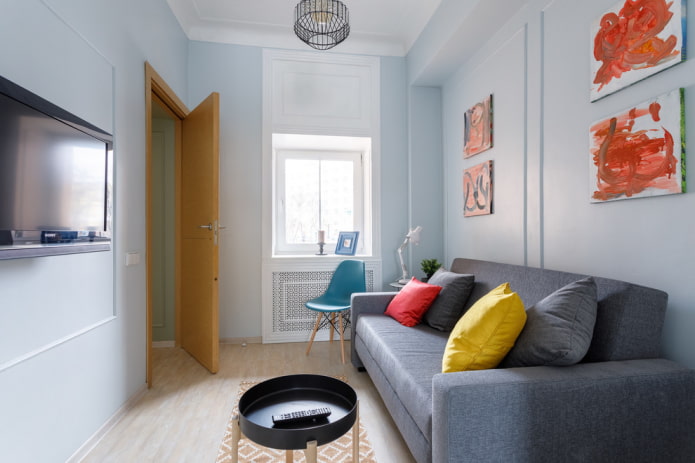
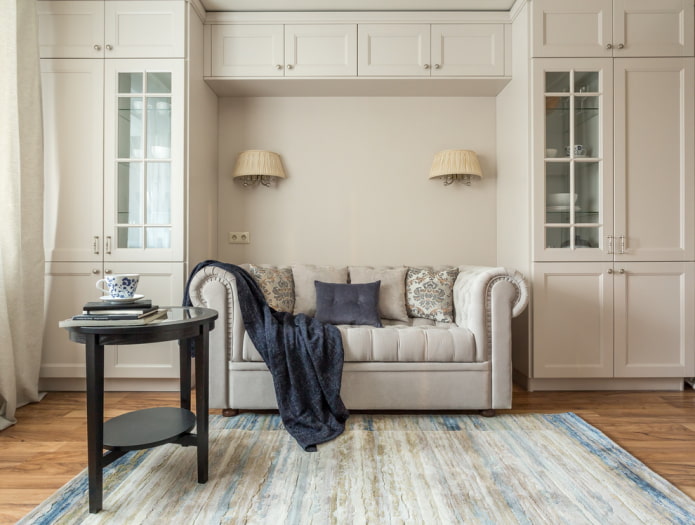
Design ideas for living rooms in different styles
To maintain a certain style, it is important to choose furniture that emphasizes the unity of the decor.
Modern style sofas
The decoration of the living room in a modern style does not differ in the variety of colors. The furniture here is functional, arranged conveniently and concisely. Geometrically correct forms prevail in its design.
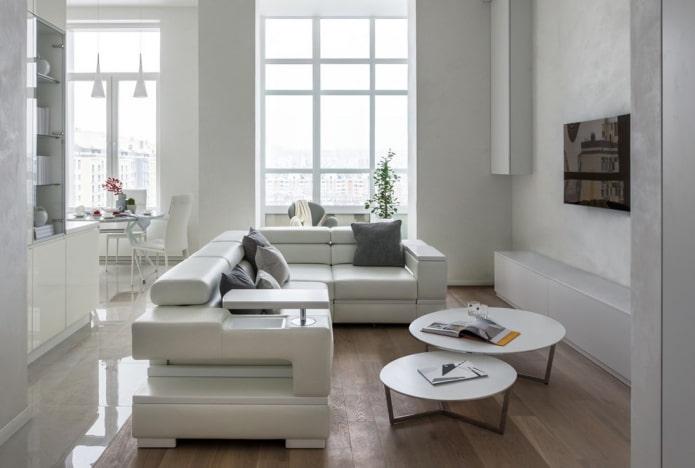
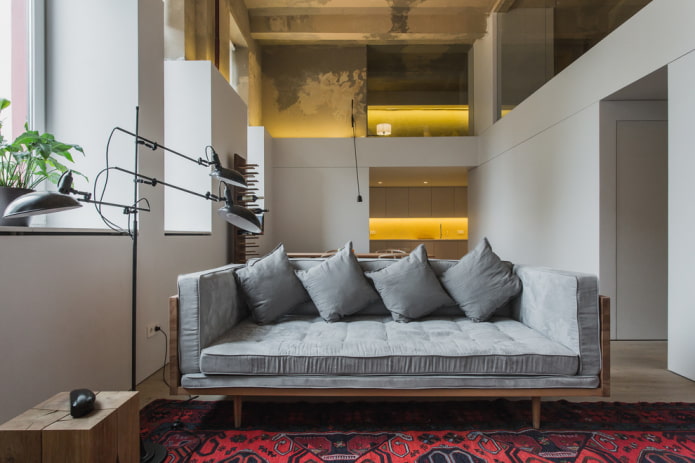
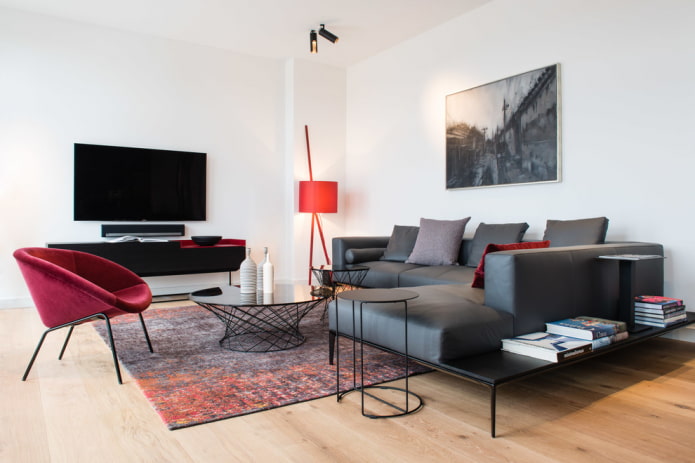
The photo shows an unusual four-seater sofa with a low back and a built-in table.
Classic
Timeless classics emphasize the owners’ love of luxury and sophistication. The furnishings are chosen to be exquisite, in pastel colors, and the upholstery is made of expensive material, such as velvet.
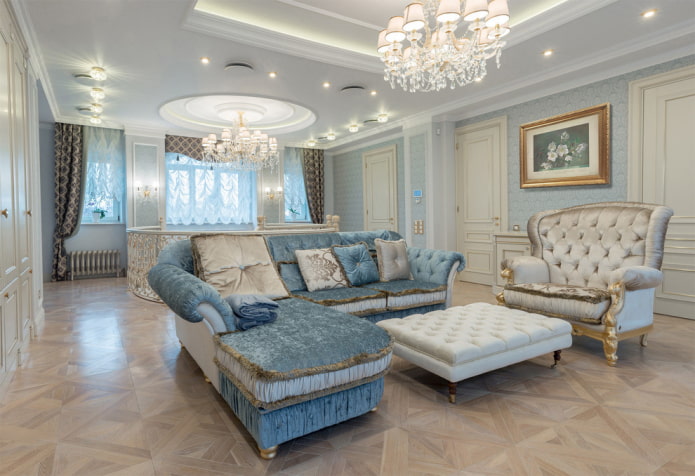
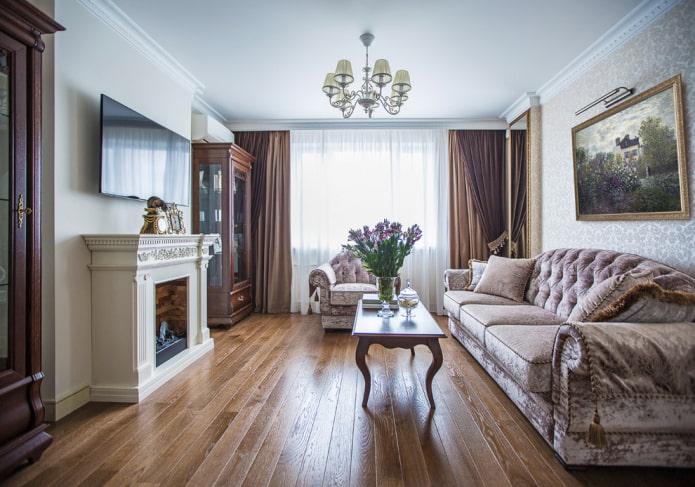
Neoclassicism
This is a combination of nobility and pragmatism. The furniture is characterized by high-quality fabrics and filling, the decor uses a natural palette and simple patterns.
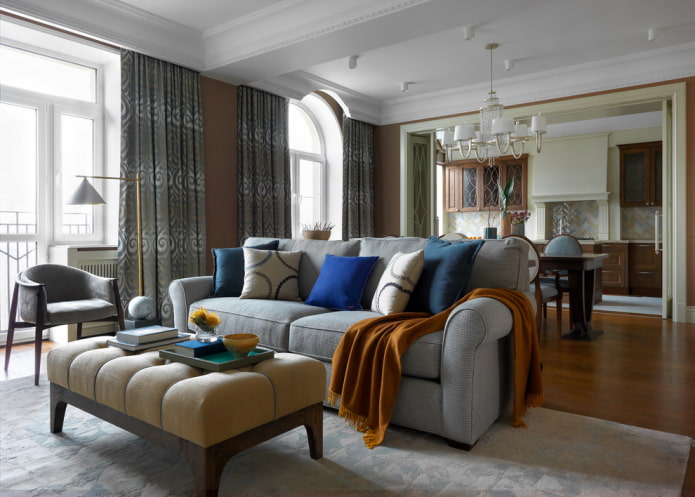
The photo shows a living room combined with a kitchen. The furniture looks neat and expensive, and the pattern on the pillows echoes the textiles on the windows.
Provence
Pacifying Provence is not associated with pretentiousness – it exudes home comfort. Soft sofas with floral patterns, quilted bedspreads, lavender shades fit perfectly into the interior.
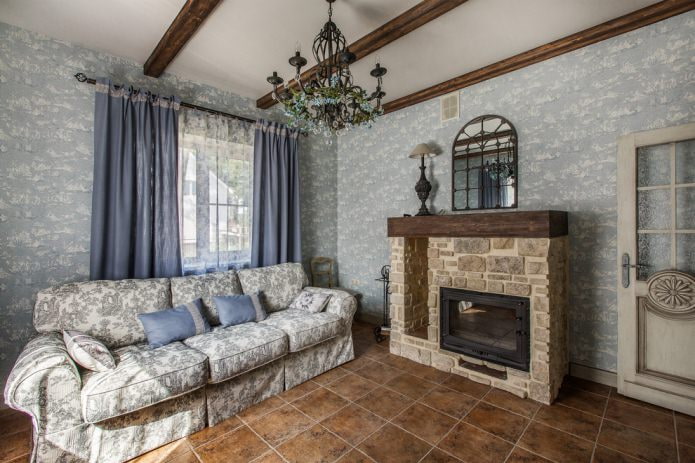
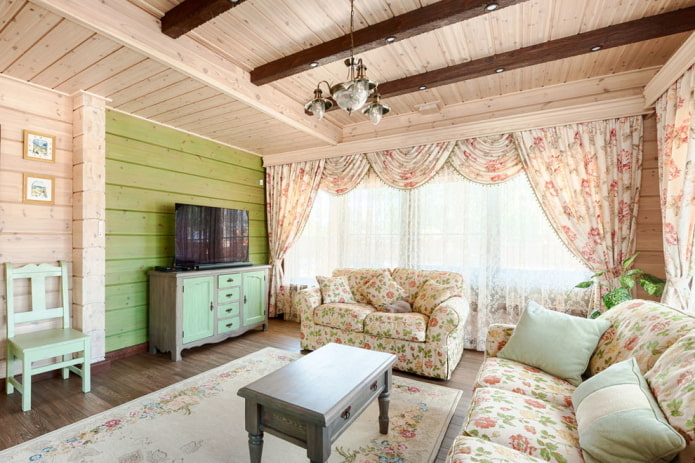
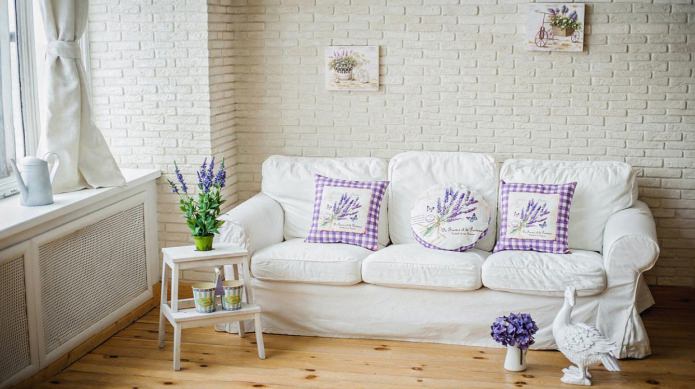
The photo shows a living room in a provincial style with a white three-seater sofa.
Minimalism
The leading colors in this style are white and gray interspersed with shades of natural wood. The space is not cluttered with furniture. The upholstery material is presented in a light palette and is devoid of complex patterns.
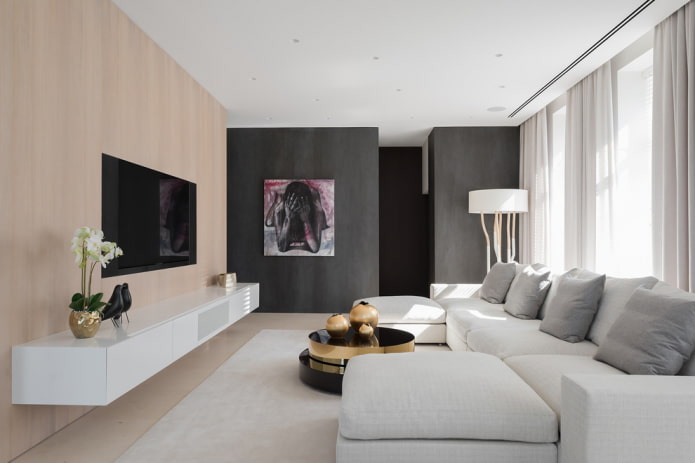
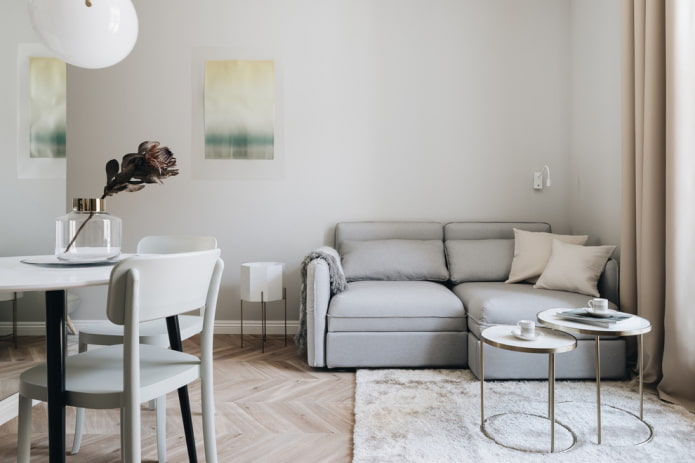
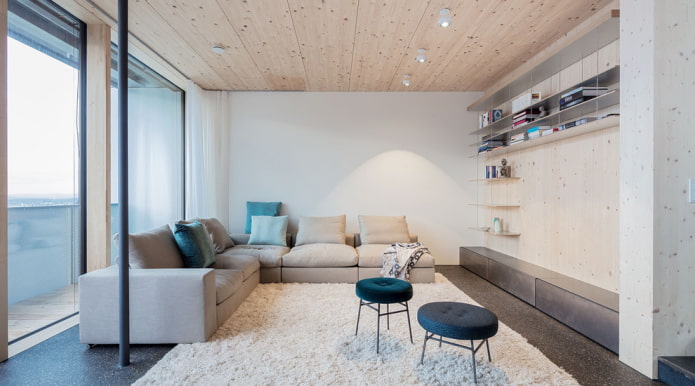
Modern
The Art Nouveau living room combines glossy surfaces and bright lighting. Modular furniture with metal elements and without bulky decorative elements is used.
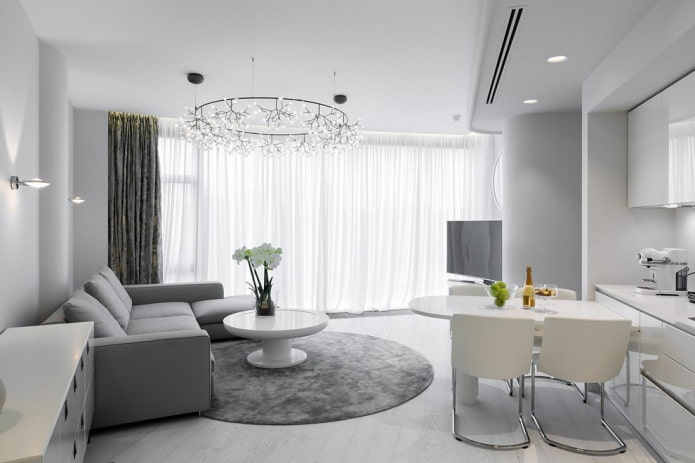
The photo shows a Art Nouveau living room, where a three-seater corner sofa is adjacent to a glossy coffee table.
Types of sofas for the hall
Furniture for relaxation also differs in types of construction:
- Modular. Consists of separate sections, with the help of which you can easily change the arrangement of furniture.
- Straight. Traditional models. A winning option for any room.
- With a sleeping place. This sofa eliminates the need to purchase additional furniture for sleeping.
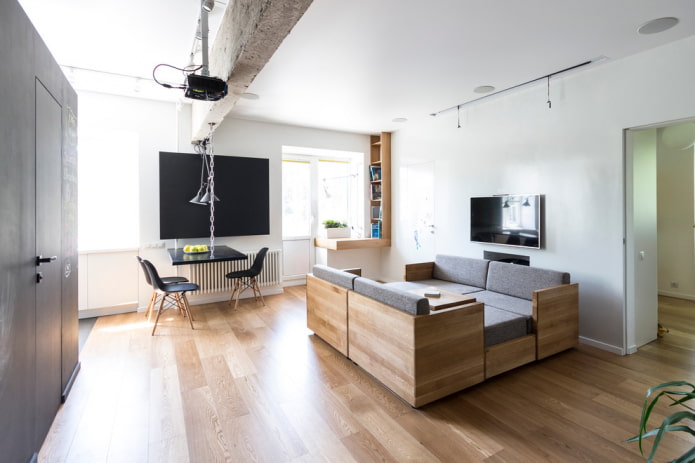
The photo shows furniture consisting of several segments that can be combined according to the needs of the owners.
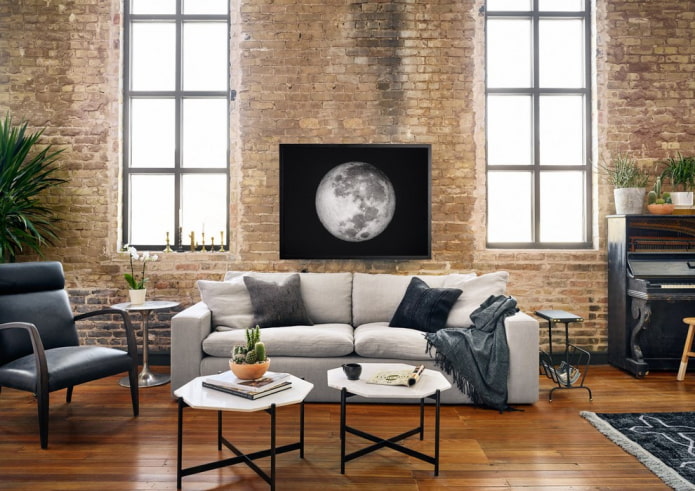
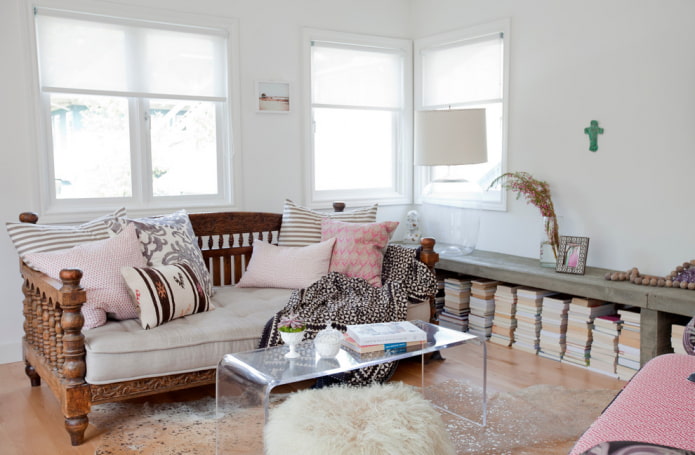
- Transformers. They have a folding mechanism with a shelf, with the help of which the structure turns into a sofa bed with an orthopedic mattress.
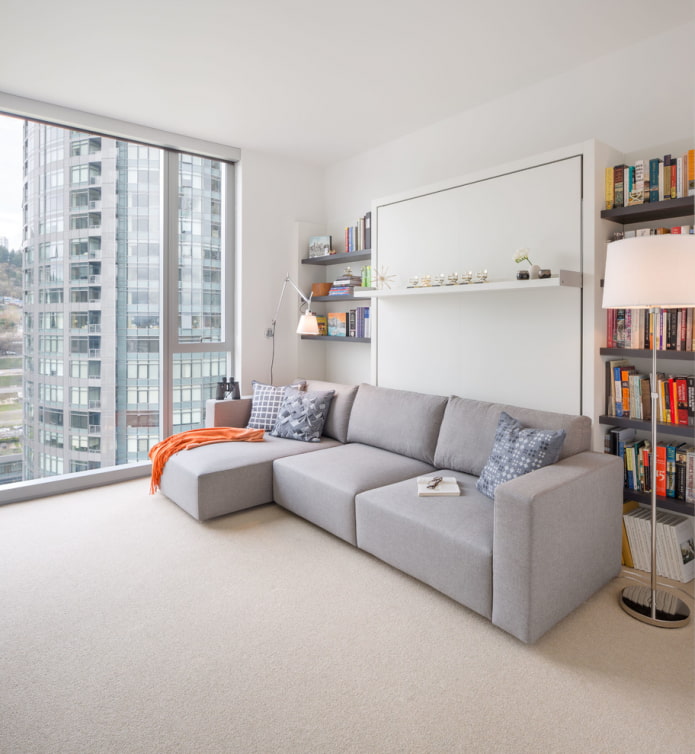
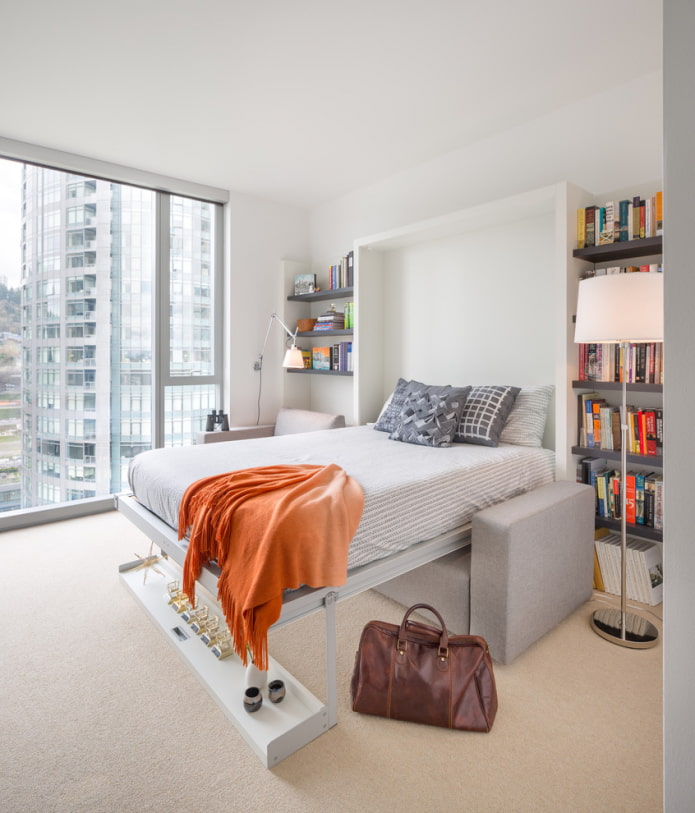
Recommendations for choosing textiles for the living room
Textiles for the sofa enliven the decor and bring color accents to it. One way to decorate the interior is to partially cover the furniture with a blanket, lay a bedspread or protect it with a cape.
Cushions are often used as decor, combining:
- monochrome upholstery and pattern;
- echoing shades;
- bright colors on a pastel background.
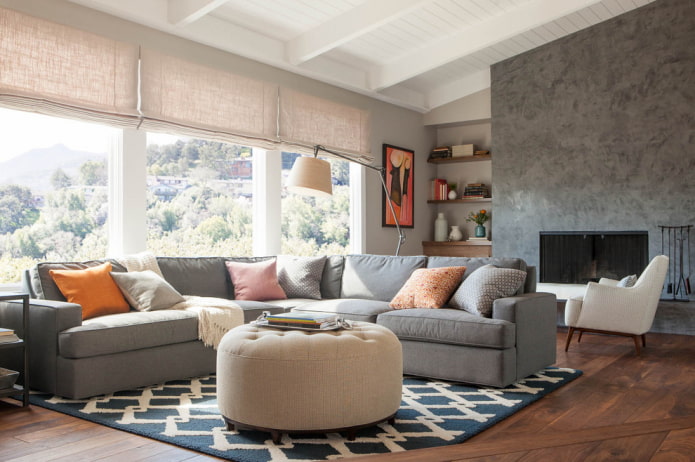
The photo shows a striking example of a successful combination of textiles: the pattern on the carpet harmonizes with the pillows, the beige blanket and ottoman – with the curtains.
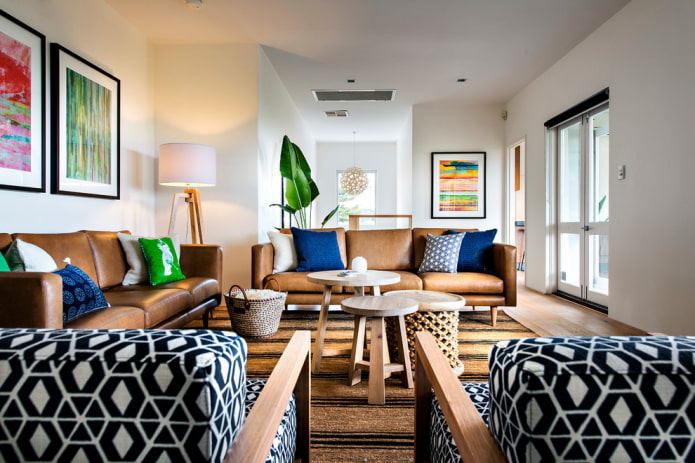
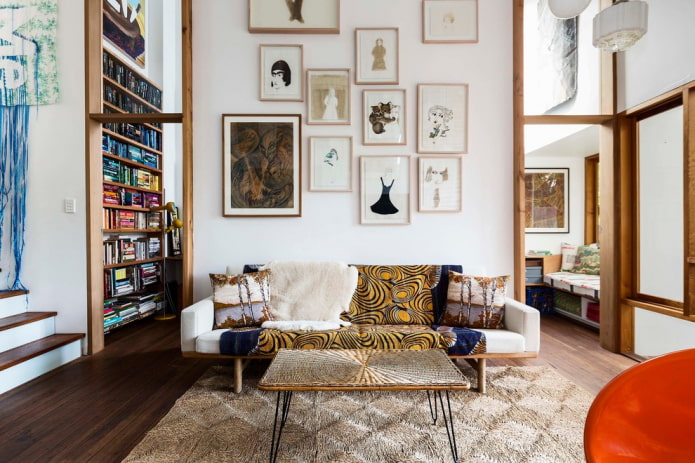
Furniture accessories often echo the curtains or carpet. You can achieve harmony in the design of textiles by varying shades and using different textures: for example, fur pillows and a carpet in the form of an animal skin.
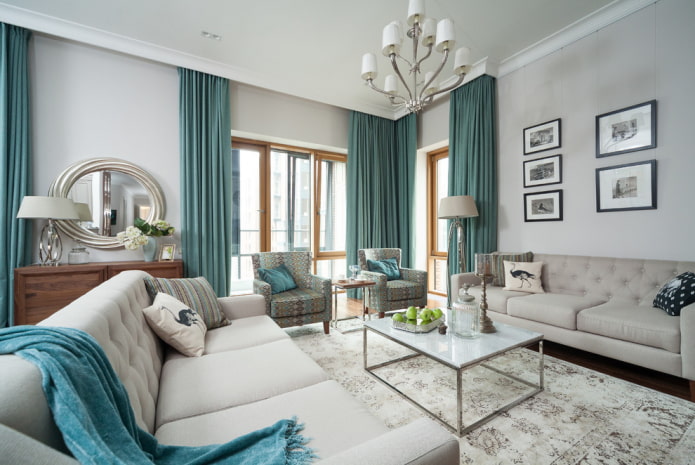
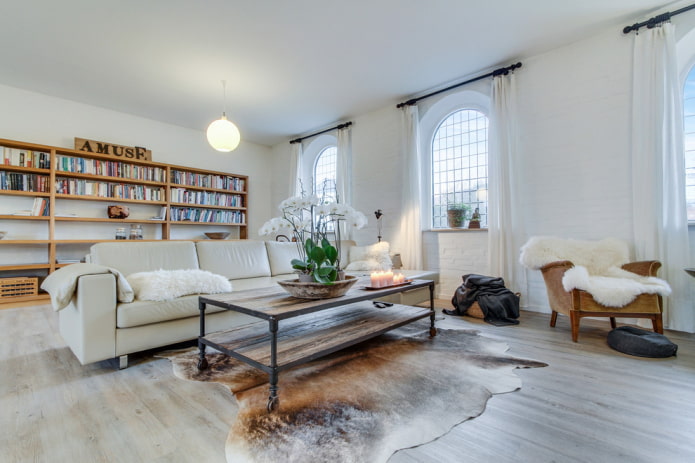
Now reading:
- Can You Hang a TV Over a Fireplace? 50 Photos and Interior Design Ideas.
- Your Complete Guide to Buying a Used Toyota
- How to combine tiles in the interior? – 10 stylish options for you
- Wardrobes around windows: more than 50 photos and ideas for the bedroom, children’s room and other rooms.
- cozy 15 m² studio with a comfortable bed: is it possible?